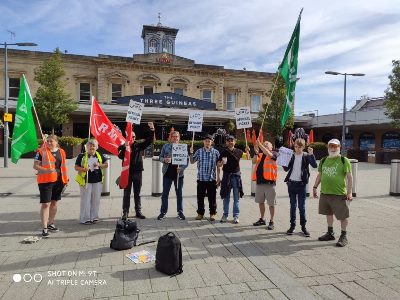
Around 50,000 RMT members will take further strike action this month in our disputes over jobs, pay, pensions and conditions.
On the mainline, members working for 14 Train Operating Companies (TOCs) and Network Rail (NR) are striking over pay offers for 2022 of 2% on the TOCs and less than 4% on NR.
These pay offers are insults, way below the rate of inflation and conditional on RMT accepting the smashing up of the rail industry. In return for these real-term pay cuts, we are expected to agree to get rid of a third of all maintenance jobs across the mainline railways, to regrade jobs with lower salaries for new staff, and to cut our pensions.
The only response is to continue the strikes, with the next action on 18 and 20 August on NR and the TOCs.
On London Underground (LU) the jobs, pensions and conditions of tube workers are being negotiated in secret by the London mayor, Transport for London (TfL) management and Grant Shapps in the Department for Transport. The only way for tube workers to force our voice into these negotiations is to strike. The next action will take place on 19 August.
In reality, rail workers on LU, the TOCs and NR are fighting a government plan to impose £4 billion of cuts across the rail industry. The aim is to slash pay and pensions and reduce job numbers, while forcing flexible working onto those left in the job.
The government hopes that a show of force against RMT will discipline the trade union movement and allow the bosses, their government and the billionaire class they represent to impose more austerity onto workers so that profits can be boosted as the economy slides into recession.
It is up to the movement to ensure that cannot happen. The public debate has shifted as a result of RMT’s nationally coordinated strike campaign that started in March. When Kirsty Wark, on Newsnight, is raising the possibility of a general strike with Mick Lynch, RMT general secretary, you know things are changing!
Step forward for workers’ unity
RMT action has now been joined by action by drivers’ union Aslef, albeit it on different days. RMT members on London Overground will strike alongside London Underground workers, and Unite are calling out 1,600 London bus drivers on 19 August. This is a massive step forward for building unity between TfL workers.
Aslef members need to demand their union takes action alongside RMT and Unite members on LU against the imposition of the managed decline of London’s transport services, and also the managed decline of the jobs, pensions and conditions of transport workers.
Outside the rail sector, postal workers and BT workers organised in the Communications Workers Union (CWU) are now in dispute, and ballots loom in Unison (NHS and local government workers) and the National Education Union of teachers and support staff.
In addition to dates over the August bank holiday, the CWU has called action on 8 and 9 September. This Royal Mail strike will greet the new Tory Prime Minister during their first week in the job. It will also come immediately preceding the Trades Union Congress, which starts on 11 September.
The RMT has a resolution on the TUC agenda calling for the TUC to: “Where possible, plan and encourage coordinated strike action”. Unions with live ballots should seek to take action on 8 and 9 September, in furtherance of their own disputes, to demonstrate coordination in action.
The lead being taken by RMT and the CWU, in promoting a coordinated defence of pay, jobs and conditions, must be applauded. It is important that the whole membership of each union are involved in discussing and agreeing tactics going forward. This means mass members’ meetings, and also meetings where reps can engage with detailed discussion on what is needed and feed that back to the unions’ executives.
Enough is Enough
RMT general secretary Mick Lynch and assistant general secretary Eddie Dempsey have joined the CWU leadership in taking the initiative of launching a campaign under the banner of Enough is Enough.
Any attempt by trade unions to unite with broader working-class communities to address the cost-of-living crisis is welcome, but it must address the issue also of who can politically represent the working class in the struggle.
If a campaign like Enough is Enough is to mobilise across the working class it must be prepared to break with a Labour Party now irrefutably under the grip of Blairite New Labour politics, and stand candidates against it.
This is graphically illustrated in London. How can tube workers vote for Labour mayor Sadiq Khan? He is our boss. He is in secret negotiations to attack our pensions, jobs and conditions. He refuses to even meet with RMT. He refuses to tell us what he is even talking to the Department for Transport about.
Massive progress has been made in recent months in building a militant fighting movement to protect workers during the cost-of-living crisis and inevitable recession that looms over us. Real wages have been falling in Britain since the banks bankrupted the economy in 2008. RMT managed to protect rail workers, in the main, during that time and this has given our members the confidence to fight now. A generalised struggle of unions across sectors could defeat the bosses and their government and push the Tories out of power. But what would replace them? A Starmer government would only pursue the same pro-business agenda under a different colour banner. Part of the generalised movement of trade unions and workers now must be to build a new party of the unions and working class with socialist policies.
